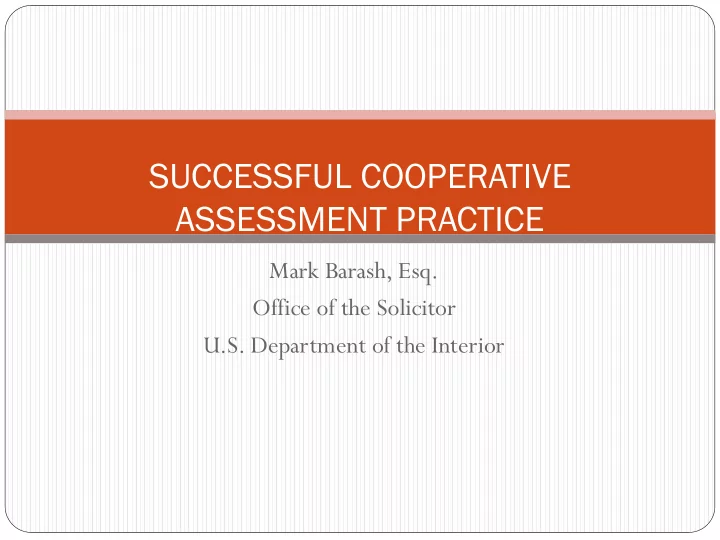

SUCCESSFUL COOPERATIVE ASSESSMENT PRACTICE Mark Barash, Esq. Office of the Solicitor U.S. Department of the Interior
REASONS TO COOPERATE Why trustees pursue coop assessment Why PRPs pursue coop assessment Understand that they are not the same PRP and trustee behavior in cooperative assessment generally consistent with their motivations and interests
TRUSTEE MOTIVATIONS TO COOPERATE Achieve restoration faster Obtain upfront funding Iteratively educate PRPs Reach settlement sooner (move on to other matters)
PRP MOTIVATIONS TO COOPERATE Obtain insight into trustee assessment Influence trustee assessment Reduce net transaction costs Reach settlement faster (get matter off their books)
TRUSTEE IMPERATIVES Cooperative assessment is one element of the Trustees’ NRD Do not allow cooperative assessment to compromise Trustees’ ability to pursue claim in other ways, if necessary
GENERAL FACTORS FOR SUCCESS Collect data jointly Share data Focus on science and restoration Establish common goals, be flexible Agree to framework for cooperation Plan ahead, communicate regularly Consider consensus in decisionmaking Learn requirements/limitations of other parties
DIFFICULT TO CONTROL FACTORS INFLUENCING SUCCESS Trustee policy Corporate policy Individual personalities Good faith, honest, adversarial, sneaky? Are they ‘trainable’? (people, institutions, can change)
SPECIFIC ISSUES AND CONSIDERATIONS Set Aside (Compartmentalize) Liability Defenses and Tactical Motives Defining Shared Objectives • Design Process to Fit Objectives
SET ASIDE, BUT DON”T IGNORE LEGAL ISSUES - Defenses and equities must be considered at some stage of negotiations -Submerged tactical motives can infect positions and undermine cooperation -Put defenses/fairness issues on the table and agree on process to address them
DEFINING OBJECTIVES, 1 Leave Pretenses at the Door Trap No. 1: We have only shared objectives Trap No. 2: The answers will emerge solely from good science Though science provides essential foundation, one purpose of cooperative assessments is to try to avoid exhaustive studies Policy and legal positions have legitimate roles, best addressed in the open
DEFINING OBJECTIVES, 2 What Do We Mean by “Cooperative Assessment”? OK to do only part of assessment jointly: -injury to specific categories of resources -all injury -identification/scoping of restoration options -comparison of alternatives -estimated restoration costs -compensatory restoration -interim lost values
DEFINING OBJECTIVES, 3 Ok to take the process step by step Consensus vs. joint work and separate conclusions
DESIGNING PROCESS Agree Up-Front on: -How interim decisions will be enshrined –Decision points –Who will make decisions, and how, if consensus fails –Consequences of breakdown –Interface between cooperative assessment conclusions and settlement negotiations If only part of assessment is “cooperative,” address process for separate technical work (e.g. information sharing, opportunities to comment)
DESIGNING PROCESS, 3 •Recognize and plan for public’s role •Consider using a mediator or other third -party neutral –Shared expert-evaluators –Choices tailored to issues
FINAL THOUGHTS Work as equals within cooperative framework Always remember it’s the Trustees’ responsibility to perform an assessment
CONTACT INFORMATION Mark Barash, Esq. Office of the Regional Solicitor U.S. Department of the Interior Suite 612, 1 Gateway Center Newton, MA 02458 (617) 527-2103 mark.barash@sol.doi.gov
Recommend
More recommend